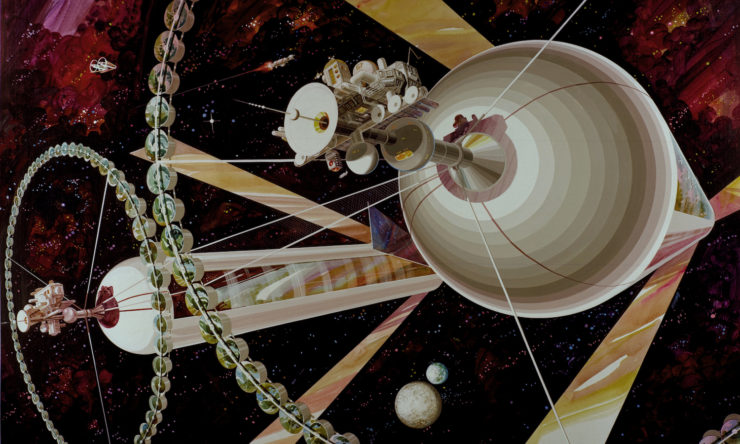Beer is the oldest human-made alcoholic beverage that we know about. People living in the Yellow River Valley (now in China) were brewing some sort of fermented grain alcohol around 9,000 B.C.E., and the first barley beer was probably made in the Zagros Mountains of Iran around 3,400 B.C.E. We’ve been drinking it, in all its ethanol-and-carbonation-filled glory, for pretty much as long as we’ve been people. Some of our earliest writing is even about beer: the Hymn to Ninkasi, the Mesopotamian goddess of beer, was not only a praise song but also a way of remembering the standard beer recipe. It stands to reason that, if humans manage to get off of earth and head for the vast reaches of the galaxy, we’d want to have some beer to drink along the way.
Which brings us to a conundrum: beer requires many ingredients that really grow best on a nice, healthy, soil-and-oxygen-rich planet. Spacefarers—particularly those on a generation ship or a self-sufficient space station, i.e. people who live in space—are going to have an interesting and difficult time making something that we’d recognize as beer, in the quantities humans tend to like to consume beer in. I recently had the pleasure, if that’s the right word for it, of trying to solve this problem for Lsel Station, a self-sufficient completely non-planetary location in my novel A Memory Called Empire, which is why I am now duty-bound to bring you the answer to how to make beer with only what you can grow on a generation ship.
Ingredients necessary for beer: water, yeast, and a starch that the yeast can work upon.
Ingredients you want if you’d like your beer to taste vaguely like the beer we know: malted barley, hops.
Let’s start with yeast. The usual yeast is a brewer’s yeast, most often Saccharomyces cerevisiae, which happens—helpfully—to be the same species as the yeast that makes bread rise. Yeasts are little live creatures—single-celled microorganisms that love to eat sugars and transform them into carbon dioxide and alcohol. They need to be kept alive. A generation ship would have had to bring a yeast colony, perhaps in the form of a sourdough starter, and feed it regularly with starches and sugars, in order to be able to have a steady supply of small organisms to brew beer with. As the generation ship matured as an ecosystem of its own, it might develop airborne yeast strains that could be harvested—but it also might not, as the usual air-purifying filters of a spaceship would kill those off. So, to have beer (and bread), the dwellers on our hypothetical ship probably have to keep their yeasts going generation after generation, in some sort of Yeast Vat. Okay. Plausible.
Next: water. If our generation ship isn’t producing adequate water supplies, we have bigger problems than a lack of beer. Let’s assume there’s enough water.
Now the hard part: starches. This is hard because even a large generation ship—let alone a permanently parked mining-and-refinery city-in-space like my Lsel Station—doesn’t have that much square footage to grow anything. There also is, well. A lack of soil. Now, traditionally in science fiction generation ships and space stations solve this problem by growing their crops hydroponically—essentially, in water. (That is, when they don’t solve this problem by having everyone eat Food Cubes, or get perfect steak dinners out of the local replicator.) And it turns out that you can grow barley hydroponically…but only to the point of getting it to the ‘fodder’ stage, where it’s useful for feeding animals, but not so much for harvesting the seeds for malting and brewing. To get the barley that far, you need some soil, at least for any barley variety we currently have. (This is one of the reasons that beer prices will rise as climate change reduces the acreage available for barley to grow here on earth—we haven’t yet been able to optimize it for growth in greenhouse conditions.) So our generation ship won’t be growing barley for beer.
Buy the Book


A Memory Called Empire
But!, you say. People brew beer with all sorts of grains! And this is true. Beers are made of sorghum, millet, and agave. Sometimes they are even made of rice. And rice, it turns out, is our solution here: rice is a brilliant hydroponic crop. However, rice grains lack the enzymes that naturally convert starches into sugars for the yeasts to feast upon. Traditionally, this is dealt with by introducing koji, a Japanese strain of Aspergillus mold, which provides the missing enzymes. It is possible that our enterprising generation-ship brewers could have brought along mold colonies—in fact it’s quite likely, as another major generation-ship crop is almost certainly funguses of all kinds. Another option is to add kelp to the rice mash—particularly a variety called ‘sugar kelp’, Saccharina latissima, which has plenty of the enzymes that convert its starches into sugars.
Even better, sugar kelp is a crop that helps keep hydroponic ecosystems healthy—it’s easy to grow, its byproducts stimulate other plant growth, and it even filters the hydroponic tanks.
So now we’ve got rice, kelp, yeast, and mold. How do we make this taste like beer? Hops. And, remarkably enough, hops do grow hydroponically. They’re a specialty crop, certainly, and our generation ship bioengineers are unlikely to devote an enormous amount of resources to growing it when they could be using that space for actual food… but it is possible to have occasional hop crops, as a luxury item.
And thus: space beer. It’ll be cloudy and not that alcoholic (from all the rice), it’ll be a luxury not a staple (because of the hops), and it will taste like the ocean if the ocean were fermented (because of the kelp). But it’s beer.
Probably. It’s beer enough.
Originally published in December 2018.
Arkady Martine writes speculative fiction when she isn’t writing Byzantine history. She is overly fond of borders, rhetoric, and liminal spaces. Her novel A Memory Called Empire is published by Tor Books. Find her on Twitter as @ArkadyMartine.











Memory is is a very good book. Well thought out on the beer. My thoughts are that for just getting alcohol into humans the plentiful supply of vacuum will help. More vodka than lager.
Ideally the fronts of the vessels might need cosmic ray protection. So staring the journey with a few hundred thousand litres of Guinness might be a better option.
That concept art is of a space colony, not a generation ship. A generation ship will spend most of its life far from the Sun and the destination star. It will have no use for those huge mirrors.
This is the abiding problem with American beer. Its drinkers are too easily satisfied.
OK, so here’s the thing. No carbonation because no such thing as a sealed vessel. Also no hops because that is from northern Europe. Also served at desert temperatures because no refrigeration. Also it more closely resembled a boozy porridge than a tall cool one. But other than that, you’re dead bang on.
The micro brewery at Jopen in Haarlem [Netherlands] has brewed a beer using seaweed. It is salty, but also an interesting draft.
Liquor is quicker …
While we may seek flavorful intoxicants, to a large extent the point of the exercise is intoxication. Witness the sometimes frightfully harsh concoctions that we’ve imbibed through history.
Nearly every culture seems to have discovered how to turn fermentables into something beer-like. Once they heard of distillation, they took that fizzy stuff and started turning it into something stronger.
Which is why I think the star travelers may devote a little more space to stills, turning a large amount of that fermented product into some type of crude vodka or moonshine.
If we’re talking rice, it would resemble shochu or baijiu. If fruit is being grown in the hydroponics bay, some of that juice, after some fermentation, could end up being distilled into various types of brandy.
I suppose the people on generation ships will have to decide whether the cost in space and resources to make beer of any kind will be worth it, or… because we’re talking beer… maybe better spent on other resources… or other forms of alcohol, assuming we don’t just breed the desire for alcohol out of us altogether.
There will probably be many things the occupants of generation ships will know they COULD make if they sacrifice other things (or people) for it. Will beer make the cut? If I had the choice, I could give it a pass. Or I’d find a much simpler way of approximating it (and probably end up with “starshine”…)
Engineer’s view to beer. Article doesn’t talk of other ramifications of leaving Earth with beer memory intact. (Maybe the book does?)
“Keeping tradition” is the typical means of staying sane both at a way station and among pioneers on the move until new ways solidify into trustworthy and non-destructive culture and civilisation.
But, since we assume that leaving Earth would also mean adapting to “radically different” circumstance – basically our primary survival trait: brain size growing and shrinking as needed over (thousands of) generations, eat anything or process it with understanding to become edible and digestible and useful – due to the complexities of producing the ingredients of traditional beer, as well as the physical effect of beer and the desire for such intoxication, we might *logically* need to come up with different solutions to intoxication more befitting the place:
Comparing the environments of Earth and a generation ship, beer could turn out to be environmentally “dangerous”, seeing that it lowers intellectual capacities, to lower social control and promote emotional and physical “bringing out the beast”, which needs a lot of room to hunt. A generation ship doesn’t have that much room to fuck things up, & working hard to produce luxury items emulating a different environment does take away mental (and resource) attention from looking to the future and actual present.
(Even if nerds would probably have a field day, and be heroes once in a while).
A host of stuff can be finely tuned to bring about complex alterations in perception of reality more fitting of an enclosed environment, while still counting the need to preserve species’ memory (“virtual beer”…) and even find complex delivery mechanism like taste and texture and temperature and tactility and “product comparison”, if need be.
And exactly that: If need be. We in fact are *no* longer cavemen. In a generation ship we most likely have total knowledge of people, and whether on board morale comes from living in the past or in the present is a management thing. Which, as we know, can easily change opinionators…
In this case of pioneering forced memory (ie. romanticising about the Earth, which no one will see again) *can* endanger adjustment to new circumstance, thus preventing species’ progress or simple survival.
A generational ship is a mini-planet. It needs to evolve to capacity in a similar fashion. If you belive that any life form un-checked will eventually kill itself, a much better idea would be to suppress all memory of (historically known) recreational drugs and let circumstance decide, and maybe use VR with “danger level” to dispell boredom, create variety.
But, IF actual beer is to be part of a recreational present, bringing along a recipe for fast-flushing alcohol from the body would probably aid civilisational survival in the long run…